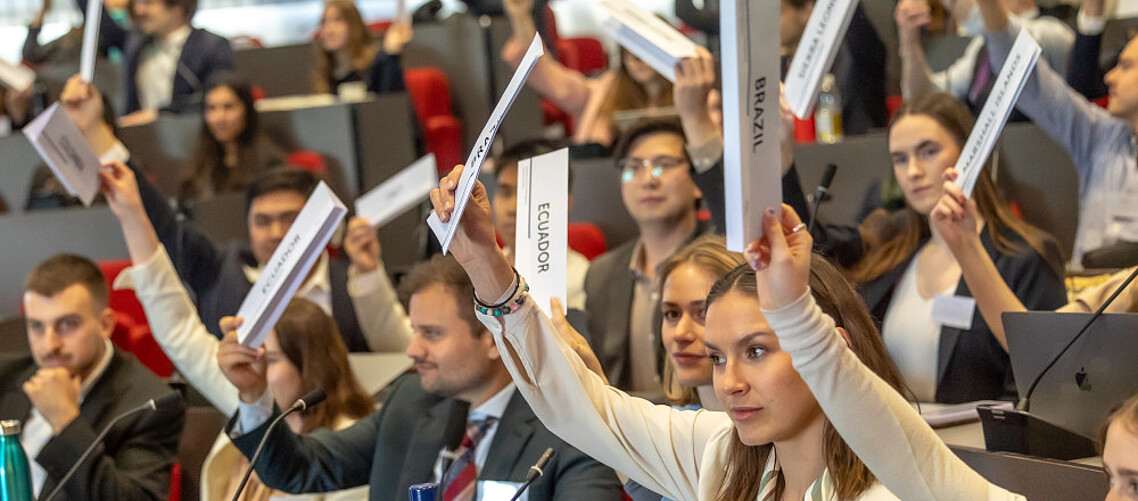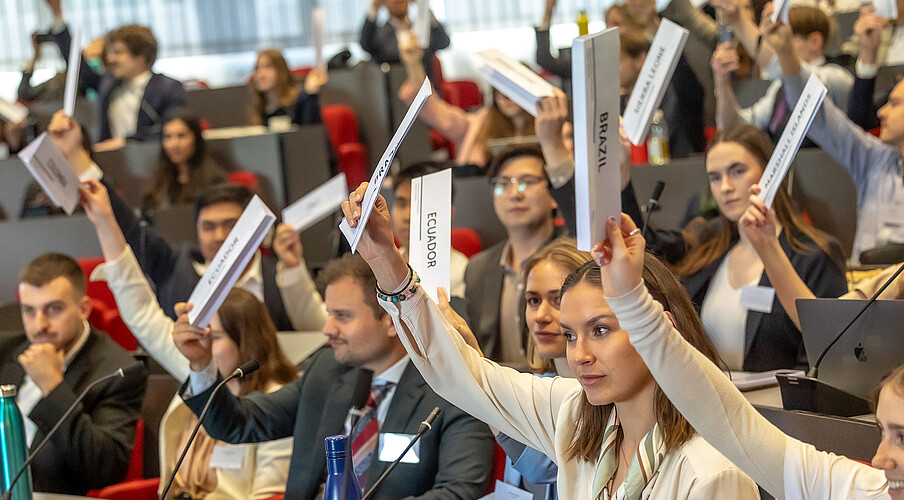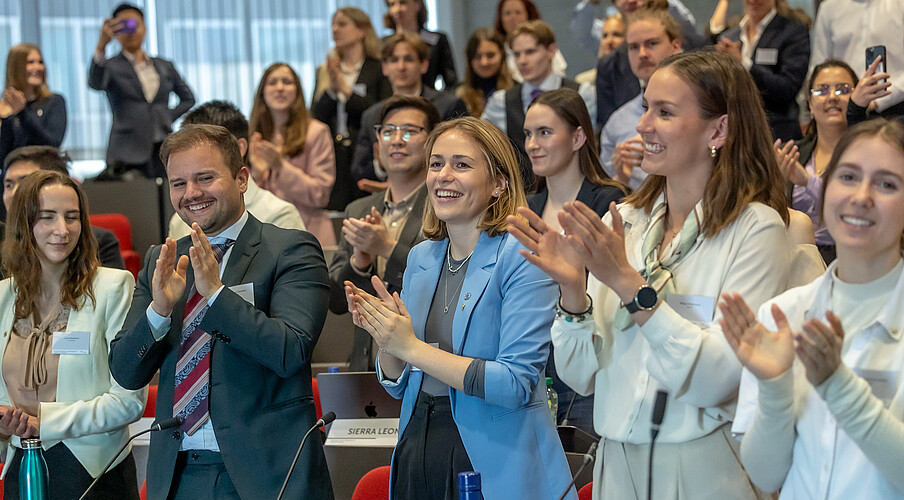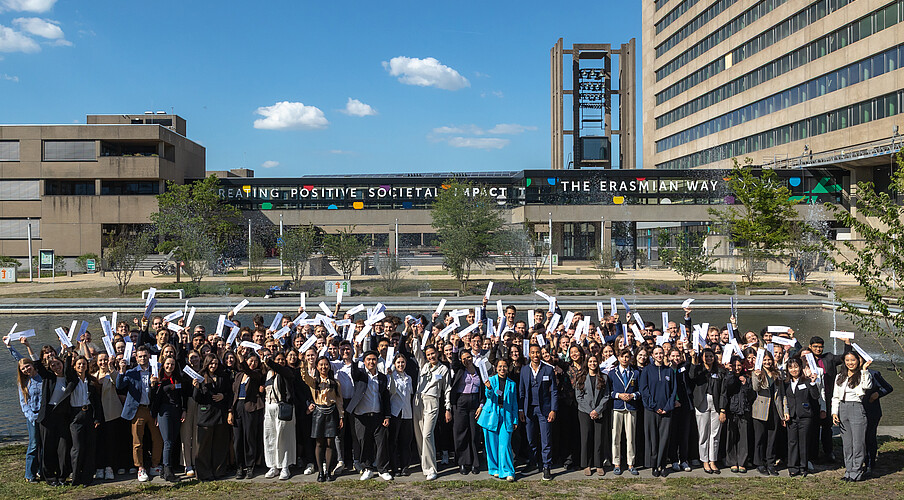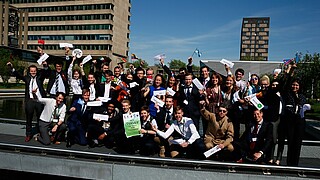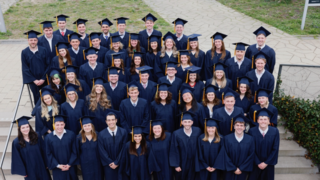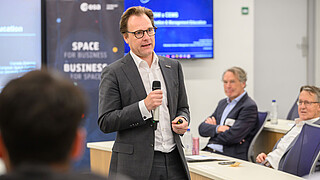The role-play is the culmination of an award-winning course delivered in parallel across the nine participating CEMSschools. Over several weeks, students gained a robust understanding of climate policy, negotiation tactics, and multilateral diplomacy before coming together in Rotterdam to represent countries, observer organisations, and key stakeholders in the global climate debate.
Nine schools, one shared mission
Participating schools included ESADE Business School (Spain), NHH Norwegian School of Economics (Norway), SGH Warsaw School of Economics (Poland), Stockholm School of Economics (Sweden), University College Dublin (Ireland), University of Cologne (Germany), University of St. Gallen (Switzerland), Corvinus University of Budapest (Hungary), and RSM (the Netherlands).
The course and role-play challenged students to balance national interests with global co-operation while grappling with legal, scientific and financial complexities. Students were assigned roles weeks in advance and prepared detailed position papers to ensure they arrived well-versed in the priorities of their assigned delegation.
A high-stakes role-play of COP30
The role-play centred around negotiations for a new global climate agreement ahead of COP30, set to be held in Brazil later this year. Students engaged in four parallel working groups on key thematic areas: mitigation and compliance, market and non-market mechanisms, cross-border issues, and adaptation and resourcing. The working groups were chaired by student facilitators, while two CEMS alumni served as the COP30 Presidency team. Professors from the participating schools acted as UNFCCC Senior Advisors, offering strategic insight without directing outcomes.
To mirror the complexity of real-world negotiations, a fictional media outlet, Amazon Watch, reported on the discussions and conducted mock interviews with delegates. Informal negotiations also took place during coffee breaks, meals, and late-night strategy sessions – adding to the authenticity and intensity of the simulation.
Dr Steve Kennedy, Associate Professor of Business Sustainability at RSM and academic lead of the course, encouraged students to embrace the Brazilian concept of Varada – a fighting spirit invoked by Brazil’s real-life COP30 Presidency.
“The varada spirit was on full display throughout the role-play. Students showed impressive levels of collaboration, creativity, and tenacity in working through tough issues,” says Dr Kennedy. “Their final agreement captured a wide range of meaningful advances, which in many cases mirrored real-world challenges. It’s a powerful reminder of what can be achieved when future leaders come together with purpose and urgency.”
A deal forged in Rotterdam
After three days of rigorous and often heated negotiations, the delegates reached a consensus on a mock agreement named the Rotterdam Commitment. The impressive 25-page document addressed a wide range of critical topics, including enhanced climate finance pledges, expansion of the Loss and Damage fund, increased support for Indigenous Peoples’ participation, and a commitment to nature-based solutions.
Dr Giuseppe Criaco, CEMS Academic Director at RSM, praised the students’ professionalism and dedication. “This role-play gives students a unique opportunity to translate their classroom learning into action,” he said. “It’s also a valuable platform for developing essential leadership qualities: negotiation, empathy and strategic thinking. We’re proud to host such a dynamic and meaningful event here at RSM.”
Learning diplomacy by doing
For many students, the experience was not only academically rigorous but deeply transformative. Alex Legrand, an RSM student representing Nigeria in the role-play, won the Best Negotiator Award in the Market and Non-Market Mechanisms group.
“Representing Nigeria was both daunting and exhilarating. It required blending empathy and assertiveness while navigating conflicting interests,” he said. “This experience made climate diplomacy feel very real – stressful at times, but incredibly rewarding. I walked away with a new appreciation for the complex realities negotiators face and the importance of amplifying voices from climate-vulnerable regions. Multilateralism is slow and imperfect, but it's still our best shot at tackling climate change.”
RSM student Bruno Ygosse Battisti, who represented the United Kingdom and was recognised as Best Negotiator in the Adaptation and Resourcing group, echoed the sentiment. “This role-play gave us a window into the challenges of diplomacy – especially when so many interests are at play. It pushed us to think creatively, collaborate, and make difficult compromises. I now better understand how frustrating it must be for real negotiators when their ambitions are limited by structural and political constraints – but also how vital their work is.”
Building the next generation of climate leaders
As the role-play closed, many students expressed a renewed sense of purpose and determination to tackle the climate crisis in their future careers. For RSM and its partners in the CEMS alliance, the Model UNFCCC is more than an academic exercise – it’s a powerful catalyst for developing the kind of leaders the world urgently needs.
The event concluded with applause, a shared sense of achievement, and new insights into the realities of climate negotiations. While the Rotterdam Commitment was only a role-play, it demonstrated the potential of cross-cultural collaboration and innovative education to empower the next generation of leaders.
RSM CEMS Master in International Management
Offered in partnership with the prestigious CEMS Global Alliance, RSM’s MSc International Management / CEMS is a top-ranked, globally oriented master programme that combines world-class academic learning with real-world business experience. Students benefit from a truly international curriculum, including a term abroad at one of 30+ elite partner schools, hands-on consultancy projects with leading multinational companies, and a powerful network of globally minded peers. With its strong emphasis on leadership, cultural agility, and sustainability, the programme prepares future leaders to thrive in dynamic, cross-border careers. www.rsm.nl/cems
